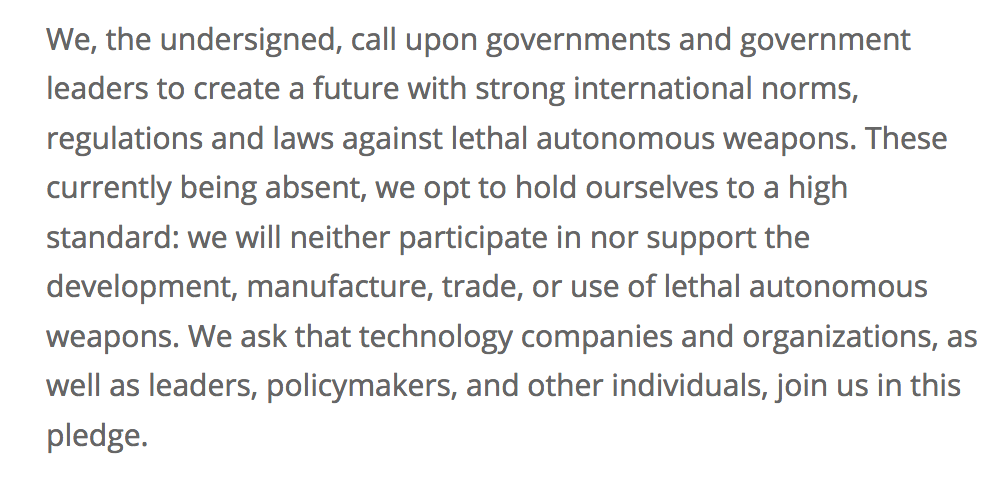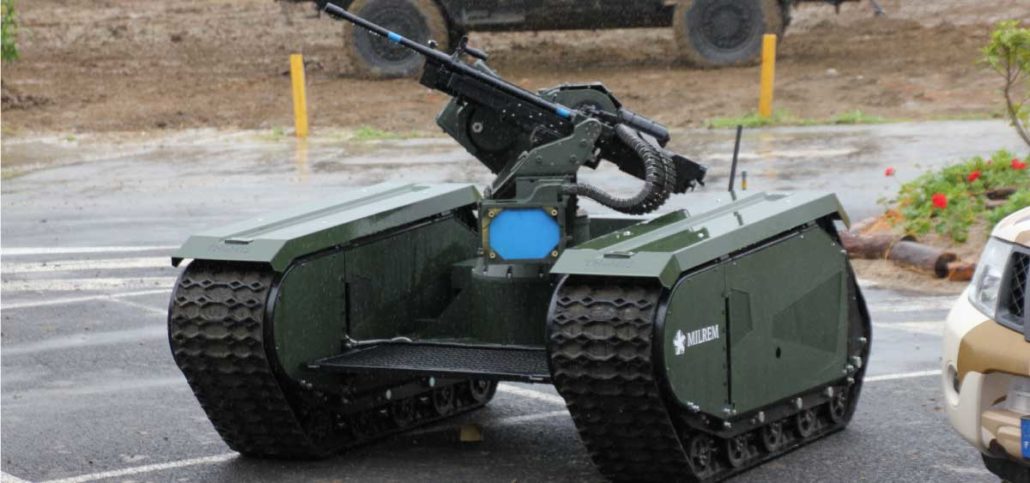About the Lethal Autonomous Weapons Systems (LAWS) Pledge
LAWS Frequently Asked Questions
Why Did Others Sign the Pledge
Press Release for LAWS Pledge
AI Companies, Researchers, Engineers, Scientists, Entrepreneurs, and Others Sign Pledge Promising Not to Develop Lethal Autonomous Weapons
Leading AI companies and researchers take concrete action against killer robots, vowing never to develop them.
Stockholm, Sweden (July 18, 2018) — After years of voicing concerns, AI leaders have, for the first time, taken concrete action against lethal autonomous weapons, signing a pledge to “neither participate in nor support the development, manufacture, trade, or use of lethal autonomous weapons.”
The pledge has been signed to date by over 160 AI-related companies and organizations from 36 countries, and 2,400 individuals from 90 countries. Signatories of the pledge include Google DeepMind, University College London, the XPRIZE Foundation, ClearPath Robotics/OTTO Motors, the European Association for AI (EurAI), the Swedish AI Society (SAIS), Demis Hassabis, British MP Alex Sobel, Elon Musk, Stuart Russell, Yoshua Bengio, Anca Dragan, and Toby Walsh.
Max Tegmark, president of the Future of Life Institute (FLI) which organized the effort, announced the pledge on July 18 in Stockholm, Sweden during the annual International Joint Conference on Artificial Intelligence (IJCAI), which draws over 5,000 of the world’s leading AI researchers. SAIS and EurAI were also organizers of this year’s IJCAI.
Said Tegmark, “I’m excited to see AI leaders shifting from talk to action, implementing a policy that politicians have thus far failed to put into effect. AI has huge potential to help the world – if we stigmatize and prevent its abuse. AI weapons that autonomously decide to kill people are as disgusting and destabilizing as bioweapons, and should be dealt with in the same way.”
Lethal autonomous weapons systems (LAWS) are weapons that can identify, target, and kill a person, without a human “in-the-loop.” That is, no person makes the final decision to authorize lethal force: the decision and authorization about whether or not someone will die is left to the autonomous weapons system. (This does not include today’s drones, which are under human control. It also does not include autonomous systems that merely defend against other weapons, since “lethal” implies killing a human.)
The pledge begins with the statement:
“Artificial intelligence (AI) is poised to play an increasing role in military systems. There is an urgent opportunity and necessity for citizens, policymakers, and leaders to distinguish between acceptable and unacceptable uses of AI.”
Another key organizer of the pledge, Toby Walsh, Scientia Professor of Artificial Intelligence at the University of New South Wales in Sydney, points out the thorny ethical issues surrounding LAWS. He states:
“We cannot hand over the decision as to who lives and who dies to machines. They do not have the ethics to do so. I encourage you and your organizations to pledge to ensure that war does not become more terrible in this way.”
Ryan Gariepy, Founder and CTO of both Clearpath Robotics and OTTO Motors, has long been a strong opponent of lethal autonomous weapons. He says:
“Clearpath continues to believe that the proliferation of lethal autonomous weapon systems remains a clear and present danger to the citizens of every country in the world. No nation will be safe, no matter how powerful. Clearpath’s concerns are shared by a wide variety of other key autonomous systems companies and developers, and we hope that governments around the world decide to invest their time and effort into autonomous systems which make their populations healthier, safer, and more productive instead of systems whose sole use is the deployment of lethal force.”
In addition to the ethical questions associated with LAWS, many advocates of an international ban on LAWS are concerned that these weapons will be difficult to control – easier to hack, more likely to end up on the black market, and easier for bad actors to obtain – which could become destabilizing for all countries, as illustrated in the FLI-released video “Slaughterbots”.
In December 2016, the UN’s Review Conference of the Convention on Conventional Weapons (CCW) began formal discussion regarding LAWS. At the most recent meeting in April, twenty-six countries announced support for some type of ban, including China. And such a ban is not without precedent. Biological weapons, chemical weapons, and space weapons were also banned not only for ethical and humanitarian reasons, but also for the destabilizing threat they posed.
The next UN meeting on LAWS will be held in August, and signatories of the pledge hope this commitment will encourage lawmakers to develop a commitment at the level of an international agreement between countries. As the pledge states:
“We, the undersigned, call upon governments and government leaders to create a future with strong international norms, regulations and laws against lethal autonomous weapons. … We ask that technology companies and organizations, as well as leaders, policymakers, and other individuals, join us in this pledge.”





